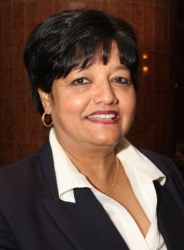SA RESEARCH BODY PUTS ENERGY POVERTY ON AGENDA AHEAD OF COP 172011-04-06 A South African research organisation is hosting an important conference on climate change in Mumbai from 9 April 2011, ahead of the 17th UN Conference on Climate Change (COP 17) which takes place in Durban later this year.
The South Africa-Netherlands Research Programme on Alternatives in Development (SANPAD) will host a three-day workshop to launch a comprehensive study by multi-national academic teams exploring global and local dimensions of climate, energy and sustainable development. The expectation for COP 17 amongst developing countries is that developed countries make further binding commitments to reduce their carbon emissions, commit to climate financing and boost technology transfers. Obtaining a multi-lateral agreement through which those most to blame for causing climate change take responsibility for the damage they are causing to those most affected by climate change, will need some tough negotiations. However, these debates will commence before Durban's COP 17 when academics from South Africa, India, China and the Netherlands gather at the Tata Institute of Social Sciences in Mumbai to relate policy, practice and alternatives on energy, climate and sustainable development in their respective countries. SANPAD is financed by the Netherlands Ministry of Foreign Affairs and funds researchers to come up with policy briefs covering various aspects, including new approaches to economic development; social development and quality of life; natural resources and their governance; democracy, government and civil society; culture identity; and civil society and poverty reduction. The Mumbai conference, convened by Dr Anshu Padayachee, CEO of SANPAD, will explore themes and aspects pertaining to global warming; energy, climate and sustainable development; renewable energy and global environmental governance. Dr Padayachee said there are wide disparities in access to energy even within the developing world, both between nations and within nations. "Lack of access to energy or the lack of adequate supply of energy is a key aspect of poverty. By one estimate, roughly a quarter of the world's population has no access to electricity. "Of those without electricity, 99% live in developing countries and 80% of them in South Asia and Sub-Saharan Africa alone. "Providing for the energy needs of this section is clearly an issue of overwhelming importance to developing countries and indeed to the world as a whole. Energy poverty is to be seen as an important element of the basket of deprivations that constitute poverty and in the context of the all-round improvement of material well-being, the expansion of access to energy has undoubtedly to take a prominent place." The Mumbai conference will hear the debates and research taking place in South Africa, China, India and the Netherlands around climate, energy and sustainable development; the successes and failures that they have experienced; and the state of policy initiatives in the respective countries. "The session on the last day will attempt to draw out themes of common interest and knowledge areas that would benefit from further exploration and study, particularly as a joint effort." The South African experience around energy matters will be related by Professor H H Vorster (North-West University), Dr Ben Sebitosi (Stellenbosch University), Dr Clare Kelso (University of Johannesburg) and Professor HJVZ Pienaar (Vaal University of Technology). The Netherlands Experience will be given by Dr Martin Junginger (Utrecht University), Dr Daniel Chavez (Institute of Social Studies), Dr Annemarije Kooijman (University of Twente) and Dr Xander van Tilburg (Energy research Centre of the Netherlands). India's energy challenges and opportunities will be described by Professor T Jayaraman (Tata Institute of Social Sciences), Professor Rangan Banerjee (Indian Institute of Technology), Sunjoy Joshi (Observer Research Foundation), Prabir Purkayashta (Centre of Technology and Development) and D Raghunandan (Delhi Science Forum). The panel discussion on the Chinese climate change scenario will be chaired by Professor Este Vorster (Africa Unit for Transdisciplinary Health Research at Northwest University) and experiences will be related by Haizhen Tian (Global Environmental Institute), Chongying Chen (Global Environmental Institute) and Dr Caizhen Lu (Chinese Academy of Sciences). ENDS Issued by: Yogin Devan Meropa Communications Tel: 031-2010550/083-3263962 On behalf of: SANPAD Durban |
SA RESEARCH BODY PUTS ENERGY POVERTY ON AGENDA AHEAD OF COP 17
Copyright © 2024 KwaZulu-Natal Top Business
